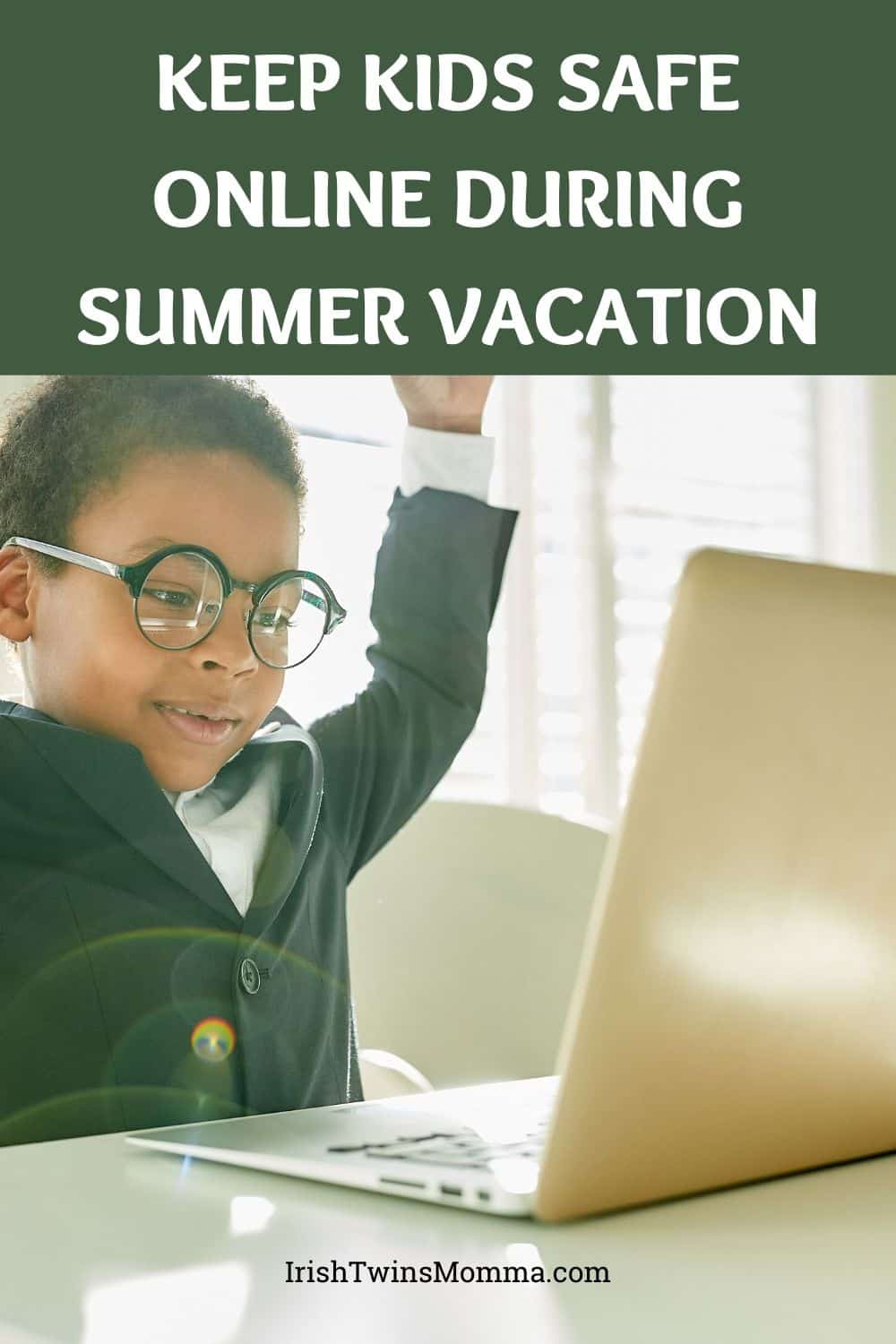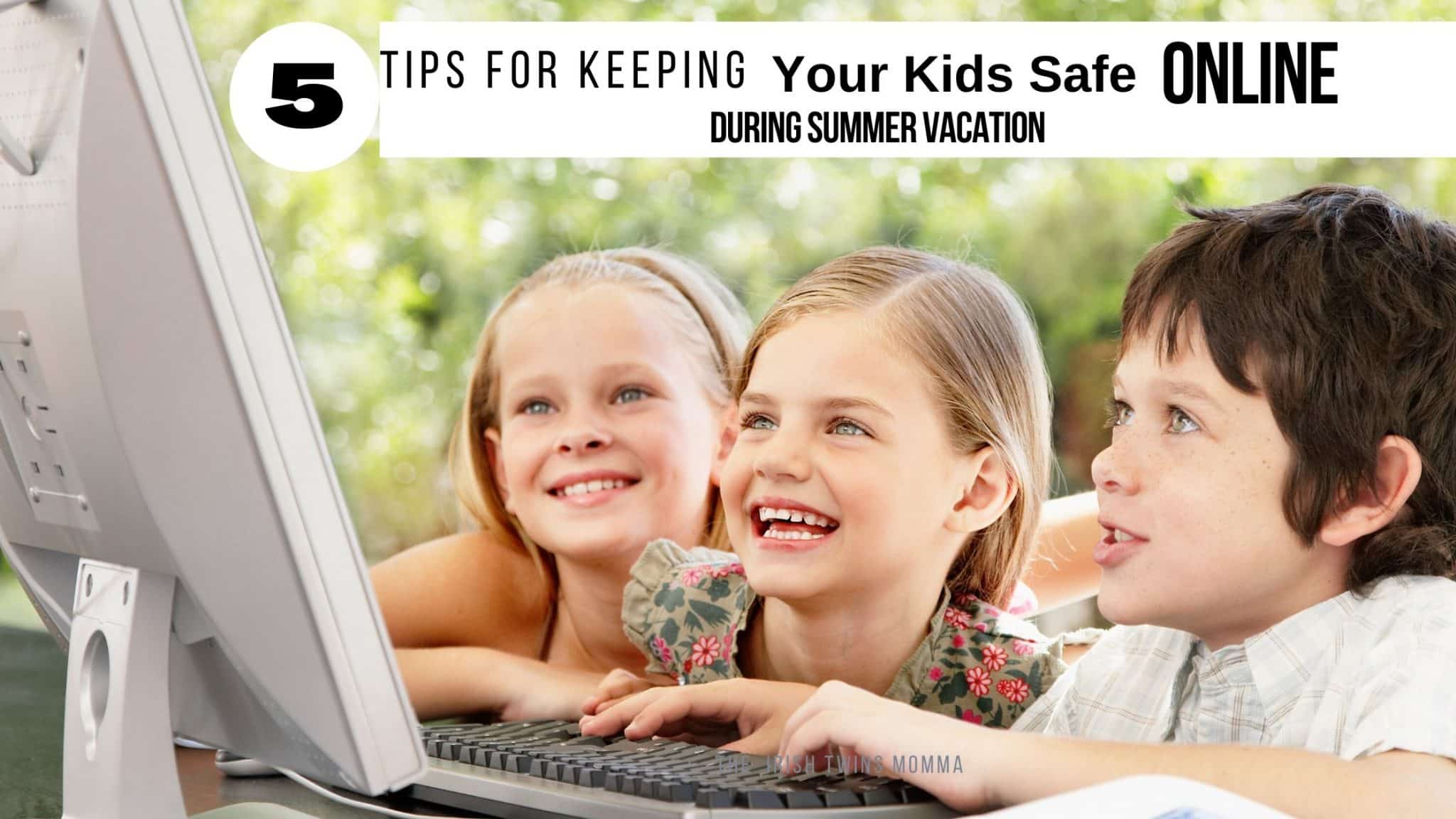This post contains affiliate links. If you click and buy, I may make a commission, at no cost to you. See my disclosure policy for more information.
Keeping our kids safe online is one of the biggest worries for modern parents. We’ve all read the headlines, see the news reports, and watched the documentaries. We know just how bad predatory behavior and cyberbullying. But just what can we do to protect our kids online during summer vacation?
How to Keep Kids Safe Online
It’s hard enough defending our kids from threats outside the front door, let alone those we can’t see. But the threat from online predators and scam artists, as well as their own peers, is all too real.
Keeping kids safe online is no different from teaching them real-world safety, such as the danger of strangers or other potential threats. Summer vacation is an ideal time to talk to your kids about internet safety and to lay down some ground rules that will help to keep them safe.
You don’t have to unplug the computer or be an internet guru to help protect your child online. The best way to keep your kids safe online as much as possible is to set some home ground rules around computer use and make sure you are available for your child to talk to.
Talk
Create an on-going dialogue about internet safety. Have an open dialogue with your child about potential threats, and what to do if something happens that they feel uncomfortable with or are unhappy about.
Emphasize that you’re not trying to frighten them, just to make sure they understand the need for caution. If your family talks frequently about both the good and bad aspects of the internet, it becomes easier to chat when either the child or the parents have concerns.
Keep communication open between parents and children. When kids see something on the Internet that makes them feel uncomfortable, assure them that they can talk to a parent or other trusted adult about it without fear of getting their computer privileges taken away.
Draw up a contract
Create your own household code of conduct, with rules that work for your child or children’s age/s. All family members should be involved in drawing this up and should sign it afterward.
The contract should cover when, where, and for how long each child can access the internet, as well as what sites they can use and who they can contact.
Restrict access
For example, no online access unless mom or dad is home. For older kids with cell phones, this may mean only accessing chat with their friends rather than surfing the net. Establish what will work for your family.
Have a family computer or laptop in a public area and make the rule that it can only be used in shared rooms such as the kitchen or living room. This way parents are able to provide supervision and guidelines more easily. You may also wish to create a list of pre-approved sites that your child can access.
Protect identities
Teach kids that they should never reveal their real name, address, age, gender, or other personal information online. To avoid criminal attention, parents should help kids to create a screen name that conceals their identity and protects them.
Make sure their online profile is blank and that they know not to share any information about their whereabouts with anyone they don’t know and trust in real life.
Ensure that children know they can only send and receive e-mail and instant messages with friends that you know. And if they want to add another name to their list you need to vet them first.
Up your security
Increase the security settings on the family PC or laptop. Make sure your firewall, anti-virus protection, and anti-spyware software are all up to date.
Make sure you have family safety settings on gaming devices, laptops, smart TVs, and other internet-enabled devices. Many popular products provide security tools to help block objectionable websites, control who corresponds with children and guard against online attacks.
Summer Rules
During summer vacation, older kids and teens often stay up late and sleep in late. Rather than playing outside a lot, today’s kids are more likely to spend the time they are awake online, playing video games, surfing the internet, and meeting friends in chat rooms or on social networking sites.
Although these online activities can provide hours of entertainment and learning, they can also expose kids to inappropriate content or people who might want to take advantage of them. As well as following the online safety guidelines above, it’s time to bring in some summer rules.
Sit down with your child and talk about their internet use. What sites will they be using over summer break? Who will they be contacting? Together draw up a list of what is acceptable.
Seize this opportunity to go over again what your child should do if something happens that they aren’t sure about or don’t like. Remind them of how friends should and shouldn’t behave so that they can recognize any harassment or bullying and come to you about it straight away.
As parents, it’s important that we prepare our children for the online world just like we do for the real world. Ultimately, the greatest thing you can do for your child is to show them that you will not judge them for their actions or choices. And if something does go wrong you will be there to help.
Sincerely,





Leave a Reply